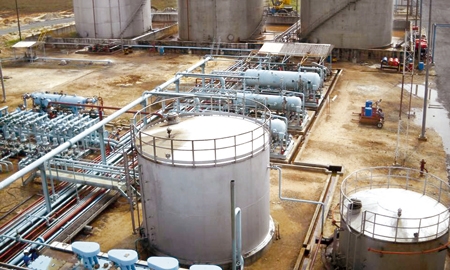Niger Delta Exploration and Production (NDEP) is a small but successful company. The enterprise is completely in the hands of Nigerian businessmen and is one of the trailblazers of Nigeria’s oil industry, which carries hope for the future of the country. Nigeria’s gas and oil production increased from 28 billion barrels in 1999 to 37 billion barrels in 2011 and the government has set itself some ambitious goals in this sector. The African state is one of the leading oil producers in the world and has enormous reserves at its disposal.
Despite these advances, the Nigerian oil industry is still dominated by multinational corporations with 93 per cent of the daily production still being carried out by these companies. Dr Layi Fatona, Managing Director of NDEP, is determined to change this situation: “We need small to mid-size Nigerian independent players like NDEP. I think it is a responsibility we owe to this country. And we want to do our best.”
The MD of NDEP is optimistic about the future: “I think the Nigerian independents are coming up and it is only a matter of time until other domestic companies will copy our business model.”
One of these players is NDEP, which has achieved outstanding success with its young workforce in the last couple of years. It is the first company in Nigeria to successfully implement a Farm-Out Agreement and was able to secure in 2010 a remarkable increase of 24 per cent in the level of investment, and 29 per cent in the shareholder’s fund. Although Dr Fatona admits that increasing production and alleviating oil prices have contributed to this achievement, there is little doubt that NDEP has taken charge of its own destiny.
“We are very aware and calculating in our handling of finances, and I believe this is evident when we look at our cost of investment. We built a 100-million-standard-cubic-feet-per-day gas processing plant for less than $100 million. So, I think it is project delivery and the costs of doing our investment that stand out amongst our achievements,” he says.
The MD goes on to explain the recipe for success of his company: “We are very much hands-on. We have a multi-tasking workforce, and I think to a large extent our performance will continue at this rate.”
More proof of the remarkable capability of NDEP and its operating company Niger Delta Petroleum Resources Ltd (NDPR) is the fact that the firm recently acquired a licence to operate a mini-refinery. This decision was initially based purely on self-sustenance because two years ago diesel was selling at a high price and the company was relying on diesel for operating its machinery. “This was beginning to adversely affect our business, so we decided to build ourselves something that would make us self-sustaining. We ended up building a very small mini-refinery, which we have operated for over three months now. It is a very significant step for our oil industry.”
NDEP is, on average, selling more than 1 million litres of diesel a month and produces 1,000 barrels daily, of which it only uses a quarter for its own demands.
Dr Fatona sees opportunities for cooperation with German businesses. “There is still an inadequacy of fabrication yards in Nigeria with all of the state of the art tools. One of the major limitations is finding adequacy of tooling for the Nigerian establishment.
“We invest a lot of money — and when I say ‘we’ I am talking about little companies — in finding the correct power tools for working. We spend a lot of money buying equipment. Therefore, we need a lot of ability to keep that equipment going for as long as they are designed. Partnerships with German engineering firms to keep that equipment going is an opportunity that I see right in front of us, as having big potential.”
The MD is convinced of the enormous potential for partnerships with German engineering companies. NDEP has already gained experience with German enterprises due to its collaboration with KCA Deutag and is very enthusiastic about that. Dr Fatona adds: “I believe that one of the best drilling contractors we have ever had is a German company, KCA Deutag. Nigeria could do with ten more of these.”

0 COMMENTS